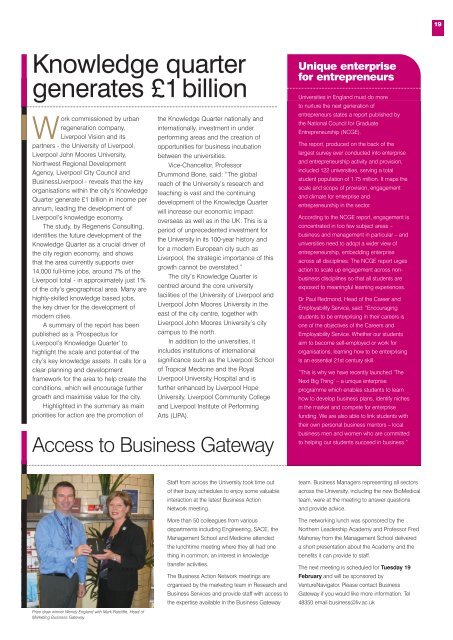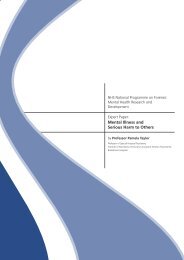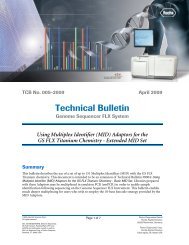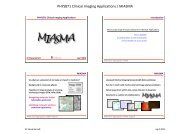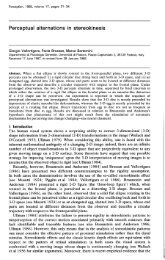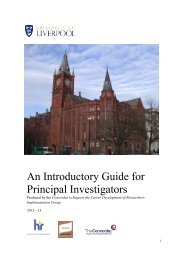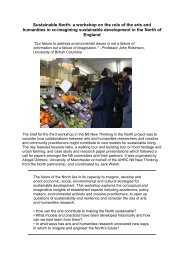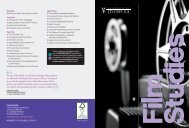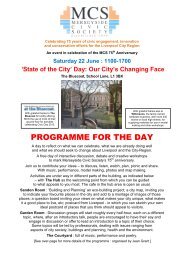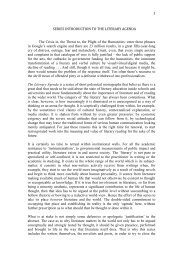Inaugural Lecture Series 2007/08 - University of Liverpool
Inaugural Lecture Series 2007/08 - University of Liverpool
Inaugural Lecture Series 2007/08 - University of Liverpool
You also want an ePaper? Increase the reach of your titles
YUMPU automatically turns print PDFs into web optimized ePapers that Google loves.
Knowledge quarter<br />
generates £1billion Universities<br />
Work commissioned by urban<br />
regeneration company,<br />
<strong>Liverpool</strong> Vision and its<br />
partners - the <strong>University</strong> <strong>of</strong> <strong>Liverpool</strong>,<br />
<strong>Liverpool</strong> John Moores <strong>University</strong>,<br />
Northwest Regional Development<br />
Agency, <strong>Liverpool</strong> City Council and<br />
Business<strong>Liverpool</strong> - reveals that the key<br />
organisations within the city’s Knowledge<br />
Quarter generate £1 billion in income per<br />
annum, leading the development <strong>of</strong><br />
<strong>Liverpool</strong>’s knowledge economy.<br />
The study, by Regeneris Consulting,<br />
identifies the future development <strong>of</strong> the<br />
Knowledge Quarter as a crucial driver <strong>of</strong><br />
the city region economy, and shows<br />
that the area currently supports over<br />
14,000 full-time jobs, around 7% <strong>of</strong> the<br />
<strong>Liverpool</strong> total - in approximately just 1%<br />
<strong>of</strong> the city’s geographical area. Many are<br />
highly-skilled knowledge based jobs,<br />
the key driver for the development <strong>of</strong><br />
modern cities.<br />
A summary <strong>of</strong> the report has been<br />
published as a ‘Prospectus for<br />
<strong>Liverpool</strong>’s Knowledge Quarter’ to<br />
highlight the scale and potential <strong>of</strong> the<br />
city’s key knowledge assets. It calls for a<br />
clear planning and development<br />
framework for the area to help create the<br />
conditions, which will encourage further<br />
growth and maximise value for the city.<br />
Highlighted in the summary as main<br />
priorities for action are the promotion <strong>of</strong><br />
the Knowledge Quarter nationally and<br />
internationally, investment in under<br />
performing areas and the creation <strong>of</strong><br />
opportunities for business incubation<br />
between the universities.<br />
Vice-Chancellor, Pr<strong>of</strong>essor<br />
Drummond Bone, said: “The global<br />
reach <strong>of</strong> the <strong>University</strong>’s research and<br />
teaching is vast and the continuing<br />
development <strong>of</strong> the Knowledge Quarter<br />
will increase our economic impact<br />
overseas as well as in the UK. This is a<br />
period <strong>of</strong> unprecedented investment for<br />
the <strong>University</strong> in its 100-year history and<br />
for a modern European city such as<br />
<strong>Liverpool</strong>, the strategic importance <strong>of</strong> this<br />
growth cannot be overstated.”<br />
The city’s Knowledge Quarter is<br />
centred around the core university<br />
facilities <strong>of</strong> the <strong>University</strong> <strong>of</strong> <strong>Liverpool</strong> and<br />
<strong>Liverpool</strong> John Moores <strong>University</strong> in the<br />
east <strong>of</strong> the city centre, together with<br />
<strong>Liverpool</strong> John Moores <strong>University</strong>’s city<br />
campus to the north.<br />
In addition to the universities, it<br />
includes institutions <strong>of</strong> international<br />
significance such as the <strong>Liverpool</strong> School<br />
<strong>of</strong> Tropical Medicine and the Royal<br />
<strong>Liverpool</strong> <strong>University</strong> Hospital and is<br />
further enhanced by <strong>Liverpool</strong> Hope<br />
<strong>University</strong>, <strong>Liverpool</strong> Community College<br />
and <strong>Liverpool</strong> Institute <strong>of</strong> Performing<br />
Arts (LIPA).<br />
Access to Business Gateway<br />
Prize draw winner Wendy England with Mark Ratcliffe, Head <strong>of</strong><br />
Marketing Business Gateway<br />
Staff from across the <strong>University</strong> took time out<br />
<strong>of</strong> their busy schedules to enjoy some valuable<br />
interaction at the latest Business Action<br />
Network meeting.<br />
More than 50 colleagues from various<br />
departments including Engineering, SACE, the<br />
Management School and Medicine attended<br />
the lunchtime meeting where they all had one<br />
thing in common; an interest in knowledge<br />
transfer activities.<br />
The Business Action Network meetings are<br />
organised by the marketing team in Research and<br />
Business Services and provide staff with access to<br />
the expertise available in the Business Gateway<br />
Unique enterprise<br />
for entrepreneurs<br />
in England must do more<br />
to nurture the next generation <strong>of</strong><br />
entrepreneurs states a report published by<br />
the National Council for Graduate<br />
Entrepreneurship (NCGE).<br />
The report, produced on the back <strong>of</strong> the<br />
largest survey ever conducted into enterprise<br />
and entrepreneurship activity and provision,<br />
included 122 universities, serving a total<br />
student population <strong>of</strong> 1.75 million. It maps the<br />
scale and scope <strong>of</strong> provision, engagement<br />
and climate for enterprise and<br />
entrepreneurship in the sector.<br />
According to the NCGE report, engagement is<br />
concentrated in too few subject areas –<br />
business and management in particular – and<br />
universities need to adopt a wider view <strong>of</strong><br />
entrepreneurship, embedding enterprise<br />
across all disciplines. The NCGE report urges<br />
action to scale up engagement across nonbusiness<br />
disciplines so that all students are<br />
exposed to meaningful learning experiences.<br />
Dr Paul Redmond, Head <strong>of</strong> the Career and<br />
Employability Service, said: “Encouraging<br />
students to be enterprising in their careers is<br />
one <strong>of</strong> the objectives <strong>of</strong> the Careers and<br />
Employability Service. Whether our students<br />
aim to become self-employed or work for<br />
organisations, learning how to be enterprising<br />
is an essential 21st century skill.<br />
“This is why we have recently launched ‘The<br />
Next Big Thing’ – a unique enterprise<br />
programme which enables students to learn<br />
how to develop business plans, identify niches<br />
in the market and compete for enterprise<br />
funding. We are also able to link students with<br />
their own personal business mentors – local<br />
business men and women who are committed<br />
to helping our students succeed in business.”<br />
team. Business Managers representing all sectors<br />
across the <strong>University</strong>, including the new BioMedical<br />
team, were at the meeting to answer questions<br />
and provide advice.<br />
The networking lunch was sponsored by the<br />
Northern Leadership Academy and Pr<strong>of</strong>essor Fred<br />
Mahoney from the Management School delivered<br />
a short presentation about the Academy and the<br />
benefits it can provide to staff.<br />
The next meeting is scheduled for Tuesday 19<br />
February and will be sponsored by<br />
VentureNavigator. Please contact Business<br />
Gateway if you would like more information. Tel<br />
48350 email business@liv.ac.uk<br />
19


